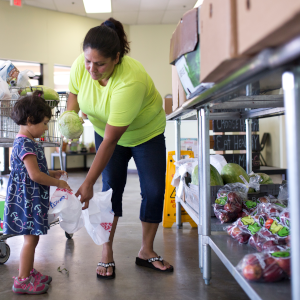FOOD DISTRIBUTION POLICY
The mission and philosophy of Roadrunner Food Bank® is to get food into the hands of the hungry without barriers. We distribute food to hundreds of organizations statewide who in turn feed the hungry in their community. Many of the organizations that distribute food from Roadrunner Food Bank are religious organizations. Throughout our history, we have continued to serve hungry people to ensure that those in need of food will receive it.
As a member of Feeding America and the New Mexico Association of Food Banks, all affiliated agencies are contractual bound to abide by food distribution policies regardless of an individual’s affiliation or creed.
To receive USDA Commodities ALL affiliated agencies are aware by contract of the following polices:
- Any agency distributing USDA commodity food has a copy of the USDA guidelines and has agreed to abide by those stated guidelines
- One hundred percent of commodity food will be used to distribute or feed only needy people. Need will be determined based on economic status, homelessness, disaster or other factors.
- Commodity foods will not be sold, traded or transferred to another group, will not be used to raise money, and will not be used for any purpose other than to feed or distribute food to needy people. If commodity foods are misused, lost or damaged due to negligence, a claim can be assessed against the agency.
- Commodity foods will be served or distributed to needy people without regard to race, color, religion, national origin, sex or handicap.
- The agency agrees to inform recipients of commodity foods that participation in the activities of the agency is not a condition of eligibility for receiving commodity food. ++
++Complete policies of eligibility criteria and New Mexico Association of Food Banks agreement to receive USDA commodities are available upon request from Roadrunner Food Bank.
Religious Proselytizing Policy
Roadrunner Food Bank’s mission is to end hunger, not to promote any religious or political affiliation. Since many of our partner agencies are churches, synagogues, and other religious entities, it would be unreasonable for the Food Bank to assume that these agencies will provide their hunger relief services without some degree of religious activity.*
However, proselytizing MUST NOT be discriminatory or onerous (burdensome or time-consuming) to the client. It is clearly stated in the Agency Letter of Agreement that the Food Bank’s food must be free to the client without any requirement of payment or action from the client. If an agency requires a client to participate in an event or a service, it is the same as requiring a client to pay for the food with the client’s time. Another issue with proselytizing is that clients coming to receive emergency food are in a vulnerable position and may feel pressured to participate. The Food Bank wants clients that are served by us and our agencies to feel safe, not pressured, when receiving their food.
Therefore, Food Bank agencies may NOT require clients or recipients to participate in any religious activity before receiving food. All distribution of food boxes, congregate meals, snacks, etc. must be concluded before any religious service or activity commences. The client must be allowed to come and pick up their food box/sack or eat their meal and leave without participating in any service or activity. Food recipients must be able to leave with the food or eat the food and then leave before having to listen to a sermon or religious teaching. In other words, all clients must be free to leave the premises before any religious or political activity begins.
*Agencies distributing USDA TEFAP commodity food products must NOT have ANY degree of religious or political activity, including prayer, involved with food distribution. Religious/political activity and commodity food distribution CANNOT occur as consecutive activities on the same day unless there is a minimum of one (1) hour separating these activities. It is strongly recommended that these activities not occur on the same day. Food recipients must not feel that participation in a political/religious activity is a requirement for receiving food, and must not feel as if they are being coerced or pressured into attending any religious or political activity prior to a food distribution, or staying for such an activity after the food distribution.

